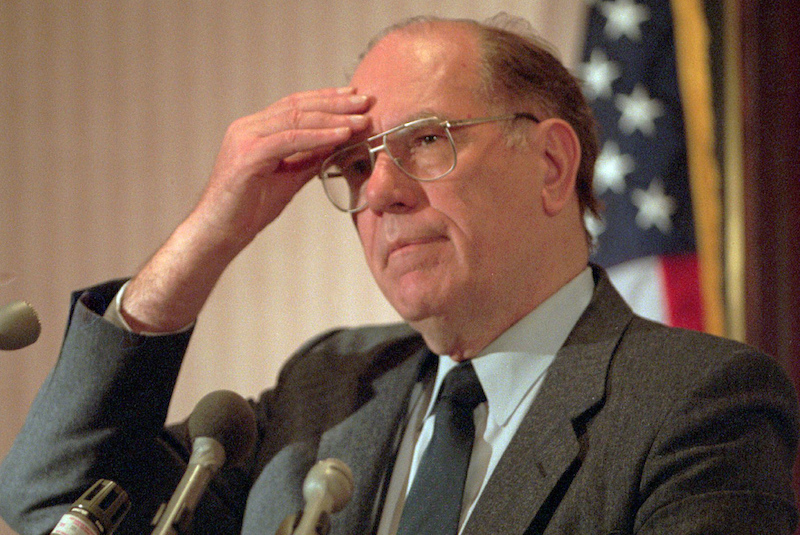Often described as an extremist crank and fringe figure, Lyndon H. LaRouche Jr. cut a shadowy and alarming path through American politics for a half-century. He built a political organization often likened to a cult and ran for president eight times, once while in prison for mail fraud. In recent decades, he operated from a heavily guarded compound near Leesburg, Virginia.
LaRouche, who built a worldwide following based on conspiracy theories, economic doom, anti-Semitism, homophobia and racism, died Feb. 12. He was 96.
His political organization, Larouche PAC, confirmed the death but did not say where or how he died.
LaRouche drew headlines for his more outrageous claims: that England’s Queen Elizabeth II was a drug trafficker and that the International Monetary Fund created and spread the AIDS virus.
LaRouchians, as the group was known, never numbered more than 3,000, according to some estimates, but were a vocal, sometimes disturbing presence on the American political landscape. They heckled, harassed and occasionally threatened opponents.
His followers “made extraordinary inroads into American politics, surpassing the achievements of any other extremist movement in recent American history,” wrote Dennis King, a New York-based LaRouche expert in his 1989 book “Lyndon LaRouche and the New American Fascism.”
“They built a nationwide election machine that fielded thousands of candidates in Democratic primaries in the mid-1980s, frequently picking up 20 percent or more of the vote and winning dozens of nominations for public office,” he wrote.
LaRouche candidates often ran disguised campaigns on mainstream tickets in an effort to trick voters into voting for them; one of their methods was to campaign under a misleading slogan such as “F.D.R. Democrats.”
During the 1984 presidential election, LaRouche received more than 76,000 votes, his highest count. Calling himself a conservative Democrat that year, he aligned his followers with the strong military and defense posture of the Reagan White House.
His campaigns proved financially lucrative. By raising $5,000 in 20 states, he qualified for federal matching funds that brought his organization millions of dollars over the years.
His operation suffered a massive blow in 1988 after he was convicted of income-tax evasion, mail fraud and a scheme that took money without permission from the credit-card accounts of elderly donors. He served five years of a 15-year sentence and ran his 1992 campaign from a federal prison.
Lyndon Hermyle LaRouche Jr. was born in Rochester, New Hampshire, on Sept. 8, 1922, and grew up in Lynn, Massachusetts. His father, an executive at a shoe-manufacturing firm, also edited an anti-communist newspaper.
Bullied at school, young Lyndon was forbidden to fight back because of the family’s pacifist Quaker beliefs. He attended Northeastern University in Boston but left, according to his memoir, “The Power of Reason,” when teachers refused to indulge in his questioning of accepted truths in geometry class.
He was a conscientious objector at the outbreak of World War II and served as an Army medic in Burma, according to followers quoted in 1985 Washington Post profile.
LaRouche associates have said their leader was drawn to revolutionary politics after the war.
Among socialists, he attracted negative attention for discursive essays he wrote in florid, stream-of-consciousness prose and was dismissed as a crank.
He split from one leftist organization after another and formed the National Caucus of Labor Committees. Initially low-key, his group reportedly became radicalized after LaRouche’s common-law wife left him in 1972 to marry one of his followers.
According to The Post, LaRouche began ordering his members to prepare for battle through karate and guerrilla training.
One of LaRouche’s cellmates in Minnesota was disgraced televangelist Jim Bakker. In his autobiography, Bakker wrote that LaRouche was good-humored much of the time and impervious to the taunts of other inmates. He also was convinced their cell was bugged.
“To say that Lyndon was slightly paranoid,” Bakker wrote, “would be like saying the Titanic had a bit of a leak.”
Copy the Story LinkSend questions/comments to the editors.



Success. Please wait for the page to reload. If the page does not reload within 5 seconds, please refresh the page.
Enter your email and password to access comments.
Hi, to comment on stories you must . This profile is in addition to your subscription and website login.
Already have a commenting profile? .
Invalid username/password.
Please check your email to confirm and complete your registration.
Only subscribers are eligible to post comments. Please subscribe or login first for digital access. Here’s why.
Use the form below to reset your password. When you've submitted your account email, we will send an email with a reset code.